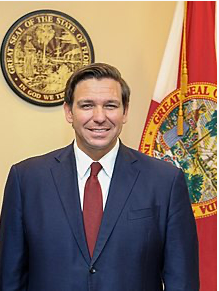By Renzo Downey
FloridaPolitics.com
April 9, 2020

Gov. Ron DeSantis signed seven bills into law late Wednesday, including measures that will place additional restrictions on ballot initiatives
The controversial bill (SB 1794) raises the threshold for citizen initiatives to trigger a judicial review and prevents petition signatures from rolling over to the next ballot. Opponents, who say the legislation effectively creates a “ballot for billionaires,” have used citizen initiatives to bypass the Legislature when some believe it’s been slow to act — such as with marijuana.
During the 2020 Session, Republicans argued the Florida Supreme Court is bogged down reviewing citizen initiatives that never earned enough signatures to appear on the November ballot. All proposed citizen initiative that passed judicial review in 2018 earned enough signatures to appear on that year’s ballot.
The trigger for judicial review would jump to 25% from 10% of total signatures required to make the ballot. Those signatures must come from one half, instead of one quarter, of the state’s congressional districts.
Half of the districts is the same sub-threshold necessary to get initiatives on the ballot. Additionally, there is a statewide threshold for initiatives to appear on ballots for public approval.
House sponsor James Grant argued last month that the changes would prevent the Constitution from being used “as a toy,” alluding to constitutional changes based on ballot initiatives as “a whim that lasts forever.”
Critics contend that by pushing judicial review — the process by which Justices determine whether ballot language is constitutional — further down in the process, groups seeking a ballot initiative would experience greater challenges getting funding to promote their efforts. Many deep-pocketed donors hold off on donating to causes until the Supreme Court has signed off because it protects their investment.
Instead, mainly proposed amendments originating from wealthy donors will have the legs to eventually make it to the ballot, they say.
A coalition of organizations, including civil-rights groups, voting-rights groups and environmental groups, sent a letter last month to DeSantis urging him to veto the bill.
“Constitutional amendments that pass do so with almost always a higher threshold than elected leaders,” the letter said. “Why should we want to limit a citizen’s ability to enact change? SB 1794 does exactly that.
The bill’s other headlining provision lets petition signatures expire if the initiative doesn’t get enough support within one two-year cycle ending at the deadline to pass the ultimate signature threshold — February 1 every even year.
Additionally, the bill would create transparency measures for election supervisors, including to report how many petitions they’ve received and how many have been validated. Proposals with a fiscal impact would need a note on the ballot saying so.
Last month, both legislative bodies passed the bill along party lines. With DeSantis’ signature, it immediately goes into effect.
The ballot requirements apply to proposed amendments beginning with this election cycle, but petitions previously gathered will not expire with the February 1 window. They instead are governed by the existing law when the signature was made — currently two years from when the signature was offered.
After delaying his deadline to sign bills to give him time to address the pressing coronavirus pandemic, DeSantis’ new deadline to approve bills is April 23.
—
Material from the News Service of Florida was used in this post.

Suanne
How do we reach the Governor to ask him not to reopen school class rooms this year?
Joe, here is contact info from the Governor’s web page:
Email the Governor at [email protected]
Due to the high volume of emails sent to the Governor, there may be a delay in responding to your email.
For additional assistance, please call the State Assistance Information Line at 800-342-3557